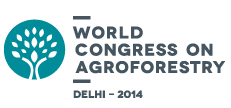Management of Ghana’s modified taungya system: challenges and strategies for improvement
Management of Ghana’s modified taungya system: challenges and strategies for improvement
wca2014-2344 Emmanuel Acheampong 1,*Thomas F. G. Insaidoo 1 1Department of Silviculture and Forest Management, Kwame Nkrumah University of Science and Technology, Kumasi, GhanaGhana has since 2001 introduced a number of forest-based strategies for improving livelihoods of forest communities, restore forest cover and address timber deficits. Among these strategies is the modified taungya system (MTS). Through a mix of qualitative methods, field observations, and a household survey among 146 MTS farmers from eight villages in the Tano Offin, Tain II and Yaya forest reserves in the high forest zone, this paper addresses some challenges related to MTS management in Ghana. Results indicate that the quality of partnership (i.e. the actors involved) matters in the performance of the scheme. First, a co-management arrangement exclusively between the Forestry Commission and MTS farmer groups generates poorer results in terms of the quality of the timber stands, income-generating potential and motivation of the actors involved. Second, the lack of income from the MTS between tree canopy closure (when the growing of food crops is no longer possible) and timber harvesting demotivates farmers to invest labour in tree farm maintenance in the meantime. Thirdly, continued commitment of both participating farmer groups and coordinating agencies is key to tree farm establishment and maintenance and the quality of timber stocks. Lastly, the prospects for future income from timber revenues determine to a large extent farmers’ commitment to tree maintenance. Linking up with theories on interactive governance and partnerships, the authors make several recommendations to overcome these challenges.

